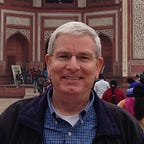What I Learned in Kabul
My best friend asked me about my feelings towards the fall of Kabul to the Taliban. He did so because he knew that I made three trips there for work in 2014 through 2016. I was not part of a military mission but working in global digital health. My efforts were to help the Afghan Ministry of Health develop information systems for tracking public health and delivering health care to its citizens.
My travel there was tightly restricted to Kabul and always under protective security. (It turns out that one never really feels safe when surrounded by bodyguards, especially armed ones.) Anyway, take the following with those caveats in mind.
It’s tempting to put my thoughts primarily in a geopolitical and historical context — that was my training as a historian. But when I think of the people I met and befriended there, it all becomes more personal. The people I worked with, talked with, and learned from are like people everywhere. They are part of families. They are part of the communities in which they live. They are also subject to, and subjects of, the biases we all have.
My first trip was to attend a conference to present thoughts about health workforce development, meaning how to create a modern health care system. I prepared by talking with people who had lived and worked in Afghanistan and conducted research on the indigenous health care approaches and therapies. These efforts tried to meld the past with the present and provide training to traditional healers so they would have better knowledge, skills, and materials. The idea was to start where the people were and go from there.
I tried to emulate these approaches when thinking about the types of tools my organization had developed to assess, train, track, and mobilize a health workforce. Looking back, perhaps my words did not land with the impact I had hoped. I was teamed with a couple of health economists from WHO. They were brought in to advise on the methods of financing and organizing the health care system. Over several days, with simultaneous and not-so-simultaneous, translation, I could begin to tell that our approaches were not getting much uptake.
The reasons seemed to come right out of the lessons I had gleaned from one informant and the books she had recommended that I read. Afghanistan is very much a rural, community-based society. Yes, to our eyes it is desperately poor and women are beneath even second-class citizenship. And I could see those lessons coming to life as members of the Afghan parliament who attended our meeting rejected a national approach to health care development. They wanted it to be incorporated into the village and managed by local leaders. They essentially said that the national government, at that time headed by Hamid Karzai, was really just a bunch of corrupt politicians. They wanted to know that their resources in a health financing system were being used locally.
There were also a couple of women who presented ideas to the entire conference that I thought brilliant and wise, but the men were obviously not paying attention. Even though these women were careful to cover their heads and wore clothing that hid their bodies, turning them into warmly dressed rectangles, they did not merit a hearing by the male leaders in the room. This, despite the fact that the Minister of Health was a woman.
It was an amazing encounter as the experts with their fancy foreign degrees and coming in from global organizations met resistance from people who clearly just wanted to be left alone. Not that they were refusing anything these outsiders wanted to buy or pay for. They just did not want the “modern” ideas and structures we were offering. I saw that many more times in subsequent trips where Afghans preferred to do things their own way. They were happy for advice, knowledge, and knowhow, as long as that was all we would contribute, and they were free to go in another direction. That was a fundamental tenet of my employer that we were not going to push ideas that did not receive ready acceptance. Hence, our efforts ended as it was clear that the reception of our approaches was not very warm — and as the security situation worsened in 2016.
Mine was less than a microscopic part of the grander picture that seems to have ended this week. One can point to the Americans, Soviets, British, and even Alexander the Great as having failed to truly penetrate the mountains surrounding Kabul. The adage that Afghanistan is where empires go to die has another affirming episode.
I met brilliant, warm, and generous people during my travels there. I feel my heart go out to my friends who are now in jeopardy because of their association with me and my country. I feel guilt and anger that that is the reality they face. My hope is that they find a path through the dark times ahead. I hope the US government helps them on their journey. It’s the least we owe them.
